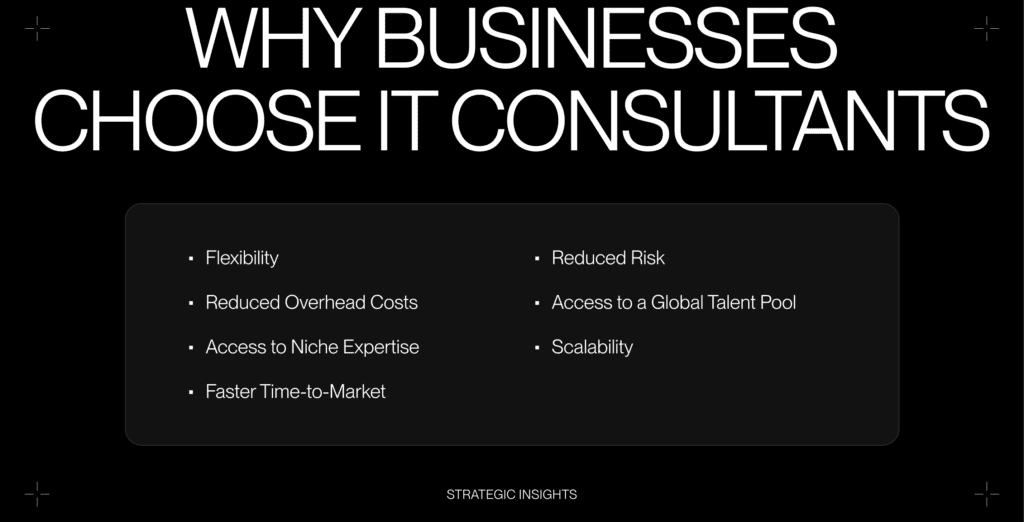Outline:
Companies frequently grapple with a crucial decision: should they commit to hiring full-time IT staff or leverage the flexibility of outsourcing hourly consultants? As the demand for efficient and specialized software development services continues to rise, businesses need to assess the balance between cost-effectiveness, expertise, and operational agility.
From consulting for technical strategies to executing UI/UX design services, the right approach to IT staffing can significantly influence a company’s performance and innovation capacity. In this guide, we’ll explore the optimal scenarios for outsourcing IT with hourly consultants rather than opting for full-time hires, taking a deep dive into the financial and strategic benefits of this approach.
Cracking the Code of IT Consulting and Hourly Rates
Understanding the Power of IT Consulting for Business Growth
IT consulting offers an extensive range of services, from cybersecurity solutions and data analytics to cloud management and network architecture. Companies turn to consultants not only to fill skill gaps but to gain insights into the latest technological advancements without the commitment of long-term employment. With the flexibility of paying by the hour, organizations can selectively employ experts based on current needs, allowing them to achieve efficient problem-solving without the financial overhead of an in-house team.
The Nuts and Bolts of IT Consultant Hourly Rates
The IT consultant hourly rate varies depending on several factors, such as experience, specialization, and geographic location. Generally, highly specialized services like cybersecurity or cloud architecture command higher rates due to the critical nature of these tasks. For instance, companies seeking UI/UX design services for product refinement or software development services to launch new platforms may find that hiring a skilled consultant on an hourly basis can yield significant savings compared to a full-time hire.
Hourly Rate vs. Salary: Breaking Down the Costs
When considering the hourly rate for an IT consultant versus a full-time salary, there are multiple financial elements to evaluate. Full-time employees entail a broader set of costs, including benefits, ongoing training, and potentially, bonuses or retirement contributions. Conversely, when you opt for an hourly consultant, the expense is limited strictly to billable hours. For businesses looking at short-term projects or intermittent IT needs, paying a rate per hour for IT services can be a more economical choice, freeing up resources for other areas of the business.

In-House IT Staff: The Pros and Cons of Going All-In
Choosing to build an in-house IT team is a significant commitment that comes with both advantages and challenges. While it offers continuity and a deeper alignment with company goals, the financial and operational implications can be substantial. Here are the strengths and limitations of going all-in with in-house IT staff
The Strength of Having IT On-Site: Building Team Dynamics and Consistency
For businesses with ongoing and evolving tech needs, having an in-house IT team offers immediate access to skills that align deeply with the company’s culture and goals. An in-house team can provide consistent support, become well-versed in specific business processes, and handle daily demands without the logistical hurdles of onboarding a new consultant each time. The continuity that comes with an in-house team often ensures that technical challenges are met swiftly and in alignment with company values.
Financial Implications of a Fixed Staff: The Hidden Costs of Loyalty
However, maintaining a full-time IT department can quickly become a financial strain. The commitment involves not only salaries but also benefits, training, and infrastructure costs. Unlike consultants who are paid by the hour, an in-house team accrues fixed costs regardless of workload, which can make resource allocation inefficient during slower periods. In situations where demand fluctuates, or where highly specialized skills are intermittently needed, investing in an in-house team can lead to higher-than-necessary expenses.
Skill Limitations and Specialized Needs: When In-House Just Isn’t Enough
A potential limitation of in-house IT staff is the range of expertise. While your team may excel in network administration or basic software maintenance, they may lack the specialized skill sets needed for specific projects. This skill gap can lead to delays and even security risks if issues aren’t promptly addressed. Companies may need to call on external experts for support in areas like UI/UX design services or software development services, particularly if those needs arise unexpectedly.
The Clear Benefits of Outsourcing IT with Hourly Consultants
Outsourcing IT tasks to hourly consultants has become a strategic choice for businesses seeking flexibility and access to specialized expertise. This approach reduces financial burdens and allows companies to adapt to changing demands with ease. Let’s explore the key benefits of leveraging hourly IT consultants and how this model can drive efficiency and agility for your organization.
- Financial Agility: Only Pay for the Expertise You Use
One of the major advantages of working with hourly IT consultants is the cost flexibility. Companies can allocate funds precisely, paying only for the hours consultants work, which eliminates the commitment of long-term salaries and benefits. For instance, if a project only requires 20 hours of specialized software development services, hiring a consultant at an IT consultant hourly rate means there’s no ongoing financial obligation once the project is completed.
- Access to Top-Tier Talent: Specialized Knowledge When You Need It Most
With hourly IT consulting, businesses can access a range of specialized skills tailored to current needs. Instead of relying on generalists, companies can bring in experts in cybersecurity, data science, or UI/UX design services as needed. This flexible access to high-level talent allows businesses to tackle complex issues or adopt new technologies without committing to a permanent hire.
- Rapid Scaling and Project Adaptability: The Benefits of On-Demand IT Support
IT needs can be highly unpredictable, and projects may require sudden scaling. Using hourly consultants offers the ability to ramp up or down with minimal hassle. For example, if a digital transformation project suddenly calls for advanced data analytics expertise, a consultant can be brought on board without disrupting the existing team structure. In peak seasons or during high-demand phases, outsourcing gives companies a flexible support model.
- Reducing Risk with Limited Commitments
Opting for hourly consultants means businesses aren’t locked into permanent arrangements. This reduced commitment lowers risk significantly, especially when entering uncertain markets or testing new products. By employing experts on an as-needed basis, companies can navigate challenging transitions without overcommitting resources, leading to greater agility and less financial strain in the long run.
Timing Is Everything: When to Choose Hourly IT Consultants Over In-House Staff
Project-Based Work: The Power of Temporary Expertise
When a project has a defined scope and timeframe, bringing on hourly IT consultants offers an efficient solution. Instead of committing to permanent hires for a short-term need, businesses can leverage specialized expertise to complete specific tasks within the project’s duration. For example, if a company is launching a new app feature, they might only need software development services for a few months, making an hourly consultant an ideal fit.
Specialized Skill Sets for Niche Requirements
Some projects require expertise that is difficult to find in the general labor market. In cases where companies need access to niche skills—such as advanced UI/UX design services or blockchain development—hourly consultants can bring valuable insights and deep technical knowledge that a typical in-house team might lack. This flexibility allows companies to maintain their competitive edge without overcommitting to a specialized, permanent role.
Budget Constraints: Maximizing Value Without Overspending
For small to mid-sized businesses with limited budgets, hiring hourly consultants provides a strategic way to manage costs. Unlike full-time salaries, which are fixed regardless of workload, hourly consulting allows companies to allocate funds to specific projects and phases, controlling costs based on immediate needs. For example, if only 15 hours of IT consulting are needed for a system audit, hiring a consultant ensures funds are spent efficiently.
Handling Urgent and High-Demand Phases
During high-demand periods or sudden project spikes, hourly consultants provide a valuable lifeline for meeting deadlines and sustaining productivity. Companies facing a short-term crunch can quickly bring on an IT consultant to address the immediate workload, whether it’s tackling security concerns or enhancing software development services for a product launch. This level of responsiveness is difficult to achieve with an in-house team alone.
Temporary Support During Major Transitions
Large transitions—such as migrating systems to the cloud, implementing new technologies, or overhauling the company’s infrastructure—often require short-term but intensive support. Bringing in an hourly consultant enables companies to complete these transitions seamlessly, with expert guidance every step of the way. Once the transition is complete, businesses can reduce their commitment, preserving financial resources for future needs.
Navigating IT Consulting Hourly Rates and Key Cost Drivers
Breaking Down Average IT Consulting Rates
When exploring the IT services rates per hour in IT consulting, it’s essential to understand how rates fluctuate based on expertise and service complexity. While general IT support might range from $75 to $150 per hour, specialized services such as UI/UX design services or cybersecurity can cost significantly more, often reaching $250 per hour or higher. Here’s a closer look at typical consulting rate brackets based on specialty:
- General IT Support and Maintenance: $75 – $150 per hour
- Network Engineering and Data Security: $100 – $200 per hour
- Software Development Services: $125 – $250 per hour
- UI/UX Design Services and Specialized IT Consulting: $150 – $300 per hour
Expertise and Experience Level: The Talent Premium
One of the most significant factors affecting hourly rates for IT consultants is the consultant’s experience level. Senior consultants with years of expertise in a niche area will naturally charge more than junior consultants. This rate differential is often justified by the speed and quality of results, especially for critical projects where accuracy and precision are paramount. Companies should weigh this cost carefully, as higher rates often correlate with fewer required hours due to increased efficiency.
Project Complexity and Technological Demands
Projects that demand advanced technical skills or deal with cutting-edge technologies like artificial intelligence or cloud migration tend to have higher consulting rates. For instance, a company looking to implement machine learning algorithms will likely encounter steeper rates than standard IT maintenance. By carefully assessing project complexity, businesses can make informed choices about budget allocation for hourly consultants.
Location and Market Demand: Geography Matters
Hourly rates can also vary widely depending on the consultant’s location. In markets with high demand for IT expertise, such as major tech hubs, rates tend to be higher due to increased competition for talent. Conversely, consultants operating in less saturated markets might offer more competitive pricing. For businesses open to remote consulting, this variation presents opportunities to control costs without sacrificing quality.
Certifications and Specializations as Cost Drivers
Certifications in areas like cybersecurity, cloud computing, and advanced software development services often lead to higher hourly rates. For instance, consultants with credentials in AWS, Google Cloud, or CISSP tend to charge a premium for their certified expertise. However, the added cost can be worthwhile for companies that require assurance of quality and specialized knowledge.
Is Hourly IT Consulting Right for Your Business: Key Factors to Consider
- Evaluate Your IT Needs: Matching Skills to Business Objectives
The decision to hire hourly consultants often starts with a clear understanding of your business’s IT requirements. Begin by analyzing your current and future needs, considering both routine tasks and specialized projects. For example, if your company regularly requires software development services or UI/UX design services for product development, hiring an hourly consultant may offer the flexibility you need. Additionally, businesses looking for expert intervention in cybersecurity or cloud management can benefit significantly from hourly consultants who can provide focused, high-quality support.
- Assess Your Budget Flexibility for Scalable Support
Your budget is a major factor in determining if hourly consulting aligns with your operational strategy. While hourly rates might seem high at first, they allow for scalable support that won’t strain your finances. By assessing the frequency and intensity of your IT needs, you can establish a realistic budget that accommodates the costs of consulting without requiring long-term financial commitments.
- Long-Term Vision vs. Short-Term Projects
Consider the long-term vision of your business. If your IT requirements are expected to grow consistently, it may be more cost-effective to hire in-house. However, if your needs are intermittent or project-based—such as periodic system audits, infrastructure upgrades, or IT consulting during product launches—hourly consulting offers a flexible, efficient solution without the overhead of permanent staff.
- Risk Tolerance and Control Preferences
Engaging hourly consultants provides a different level of control compared to an in-house team. If your business prefers a hands-on approach with IT management, consider how much control you’re willing to relinquish. For companies with a higher risk tolerance, hourly consulting offers a way to access high-level skills while maintaining focus on core competencies. Businesses with lower risk tolerance, however, may prefer the continuity of a full-time team for essential daily functions.
- Future-Proofing Your Business with Scalable Solutions
Hourly IT consulting provides a scalable approach that adapts to your company’s growth. When engaging in expansion, new product launches, or system upgrades, having access to specialized hourly consultants enables smooth transitions. This flexibility empowers your business to remain agile, particularly when navigating the uncertainties of rapidly changing markets or technology landscapes.
Choosing the Right IT Consultant for Optimal Results
Identify Core Skills and Relevant Experience
Selecting the right IT consultant starts with identifying the specific skills and experience your project demands. Whether you need software development services, UI/UX design services, or cybersecurity expertise, prioritizing consultants with a proven track record in those areas ensures the highest quality of work. Assessing a consultant’s portfolio or past projects can give you valuable insights into their capabilities and approach to solving similar challenges.
Seek Out Referrals and Reputation for Credibility
The best consultants come with a strong reputation and positive referrals. Ask for recommendations from other businesses within your network, or look for testimonials from past clients. Trusted consultants often have extensive industry experience, and strong references offer reassurance that the consultant has delivered quality results in similar contexts. This credibility is essential when hiring for high-stakes projects where trust is paramount.
Assess Compatibility with Your Business Culture
Cultural compatibility plays a crucial role in the success of any consulting relationship. During the selection process, consider how well the consultant’s communication style, approach, and work ethic align with your organization’s culture. A consultant who can seamlessly integrate with your team will be more effective in delivering results, especially for collaborative projects where consistent communication is key.
Balance Expertise with Budget Expectations
While it can be tempting to hire the top expert in a particular field, it’s essential to find a consultant who aligns with your budget constraints. Compare hourly rates, experience, and skills to select someone who meets your quality standards without overspending. Many consultants provide a range of pricing options, allowing businesses to find the best fit between expertise and cost.
Set Clear Goals and Expectations for Successful Engagement
Once you’ve chosen a consultant, setting clear expectations is crucial. Define project goals, timelines, and metrics for success from the outset, ensuring that both parties are aligned. This clarity fosters accountability and streamlines project management, providing both you and the consultant with a structured roadmap to follow throughout the engagement.
Potential Challenges of Using Hourly IT Consultants
While hiring hourly IT consultants offers flexibility and access to specialized expertise, it’s not without its challenges. From managing dependencies to ensuring consistent quality, businesses need to be aware of potential pitfalls and how to address them effectively.
Dependency on External Providers: Managing Consultant Reliance
Relying on hourly consultants can introduce a dependency on external talent, especially if the same consultant is engaged for recurring projects. Over time, this reliance can lead to gaps in institutional knowledge, as the consultant holds critical insights that aren’t fully transferred to the in-house team. For companies seeking independence, it’s important to manage knowledge-sharing protocols to reduce potential gaps when the consultant is no longer engaged.
Communication and Coordination Barriers
One of the main challenges with hiring hourly consultants is ensuring smooth communication and coordination with the in-house team. Depending on time zones and work styles, there may be delays in response times or misalignment in project goals. Clear communication protocols are essential, including regular check-ins and documentation to keep everyone informed, aligned, and on track.
Quality and Consistency Risks
Hourly consultants may come from different backgrounds and industries, which can result in inconsistencies in work quality or project approach. It’s important to maintain consistent standards and communicate quality expectations upfront. For businesses using multiple consultants, establishing a review process can help ensure uniformity in deliverables and minimize variation in outcomes.
Risk of Higher Cumulative Costs
Although hourly consulting offers flexibility, there is a risk of costs adding up if the engagement extends over a long period. For example, if a project requires 200 hours of consulting at a rate of $150 per hour, costs can quickly exceed the annual salary of an in-house employee. Companies should carefully assess the duration and frequency of consulting needs, balancing project timelines against budget constraints to avoid hidden expenses.
Security and Confidentiality Concerns
Working with external consultants introduces potential risks related to data security and confidentiality. Consultants may have access to sensitive information, which could expose the company to security vulnerabilities. To mitigate these risks, businesses should establish clear data protection policies, utilize confidentiality agreements, and limit access to sensitive information as needed.
On a Final Note
Businesses frequently face the decision between building an in-house IT team and engaging hourly consultants, each offering distinct benefits. In-house teams provide continuous support and foster in-depth knowledge of company processes, which is invaluable for day-to-day stability. On the other hand, hiring IT consultants on an hourly basis offers cost-efficient access to specialized skills, allowing companies to bring in expertise like software development services, UI/UX design services, or IT consulting precisely when needed without long-term commitment.
For companies with fluctuating project demands, this flexibility can be a strategic advantage, maximizing value without incurring full-time costs. Many companies find that a blended approach—combining an in-house team for regular operations with consultants for specialized, short-term projects—strikes the right balance. If you’re exploring how to optimize IT management in line with your business goals, our expert consultants are here to help. Contact us to learn how our flexible IT consulting services can support your success.





